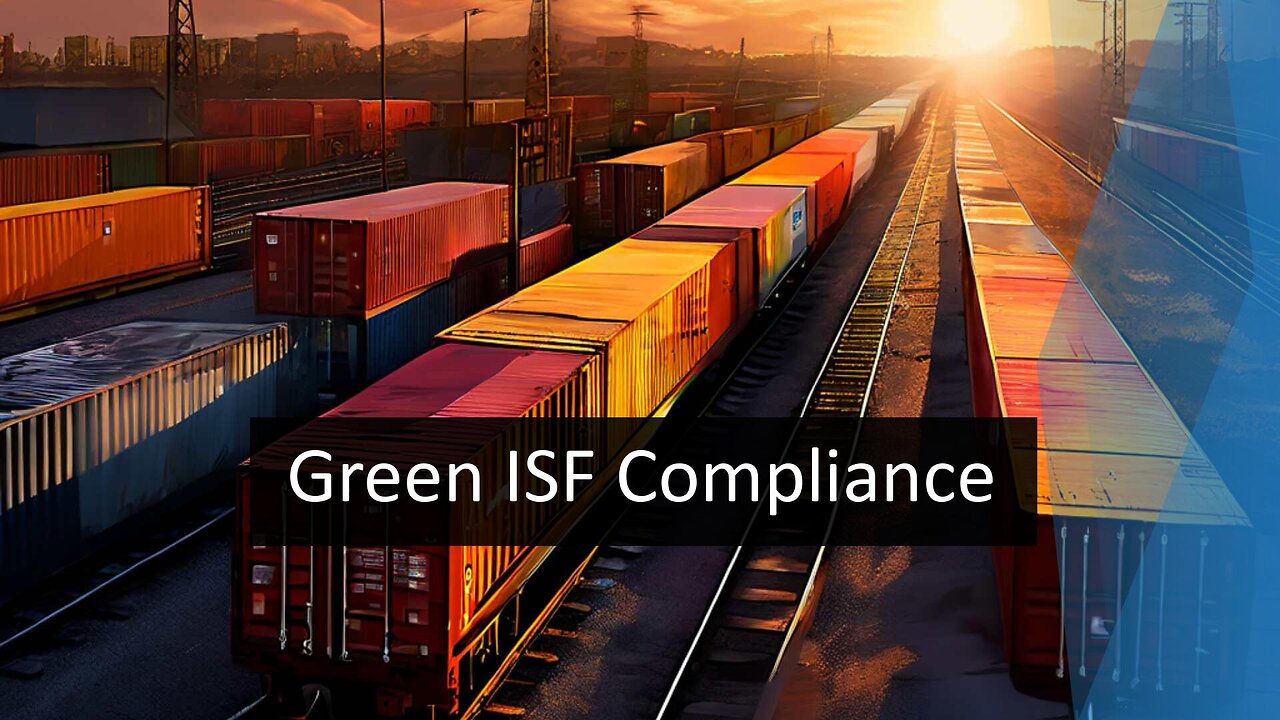Premium Only Content

The Green Side of Importing: How Environmental Regulations Impact ISF Filing
License To Import // 323-578-6432 // file@licensetoimport.com // www.licensetoimport.com
This response deep dives into the impact of environmental regulations on Importer Security Filing (ISF) in customs brokerage. It begins by defining environmental regulations as government-established measures to protect the environment and promote sustainable practices in industries like import-export. It then explores how these regulations affect ISF filing, focusing on the requirement to report additional information related to the environmental impact of imported goods. The importance of understanding and complying with these reporting requirements is highlighted, as it contributes to the development of greener supply chains and helps importers avoid penalties and delays. The response also discusses how environmental regulations can influence the selection of customs bonds, emphasizing the need to obtain bonds that address environmental responsibilities. Balancing sustainability and compliance in customs brokerage presents challenges but also opportunities for innovative and collaborative solutions. Importers are encouraged to evaluate their supply chains, adopt sustainable practices, and seek expertise from customs brokers and other stakeholders. Overall, compliance with environmental regulations in ISF filing not only fulfills legal and ethical responsibilities but also promotes a greener future of global trade.
#CustomsBrokerage #InternationalTrade #EnvironmentalRegulations #SustainableTrade #ISFfiling #Compliance #CarbonFootprint #SustainabilityMatters #GreenerSupplyChains #LicenseToImport
Video Disclaimer Here: This video is solely for education and is not endorsed by any US government agency.
"00:55 Environmental regulations play a significant role in Importer Security Filing (ISF) in global trade, aiming to minimize negative impacts on ecosystems and promote sustainable business practices in import-export industries.
01:24 Importers are required to report additional information related to the environmental impact of imported goods during the ISF filing process, such as carbon emissions, use of environmentally hazardous materials, and compliance with eco-friendly packaging standards.
02:08 Compliance with environmental reporting requirements not only helps importers avoid penalties and delays but also contributes to the development of greener supply chains and identification of eco-friendly alternatives.
03:24 Importers must balance sustainability with compliance by evaluating the environmental impact of their supply chains, adopting sustainable practices, and collaborating with customs brokers and stakeholders to navigate complex requirements, ensuring a greener and more sustainable future for global trade."
-
 23:21
23:21
Stephen Gardner
17 hours ago🔥Trump DISCOVERS exactly who BETRAYED Him!!
13.9K122 -
 39:56
39:56
TampaAerialMedia
3 hours agoBeautiful VERMONT - 15 Towns & 7 Scenic Highways - Burlington, Woodstock, Brattleboro, & More
4.2K3 -
 1:04:24
1:04:24
Tactical Advisor
5 hours agoBattlehawk Build Of The Month /Giveaway Winner | Vault Room LIVE Stream 009
84.4K15 -
 LIVE
LIVE
I_Came_With_Fire_Podcast
12 hours ago"Houska Castle: Gateway to Hell, Nazi Occultism, & Ancient Legends"
1,852 watching -
 26:20
26:20
Degenerate Jay
1 day ago $7.21 earnedThe Best Transformers Movie? - Bumblebee Movie Review
34.9K6 -
 10:12
10:12
This Bahamian Gyal
16 hours agoInfluencer hired HITMEN to OFF social media rival
28K3 -
 7:05
7:05
Dr. Nick Zyrowski
1 day agoVitamin D Mistakes Most People Make - Never Do This!
23.3K2 -
 2:11:13
2:11:13
Squaring The Circle, A Randall Carlson Podcast
22 hours ago#29 Thermonuclear War: Shall We Play A Game? - Squaring the Circle: A Randall Carlson Podcast
45.8K31 -
 45:32
45:32
PMG
12 hours ago $12.69 earned"Are THEY HIDING Jeffrey Epsteins Video Tapes?"
50.3K5 -
 1:32:23
1:32:23
Game On!
18 hours ago $15.69 earnedCongrats to the Kansas City Chiefs and NFL refs on another victory!
86.5K5